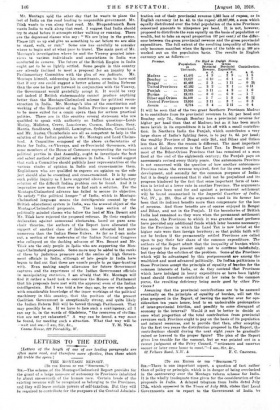LETTERS TO THE EDITOR
[Letters of the length of one .4 our leading paragraphs are often more read, and therefore more efiectine, than those which fill treble the space.]
THE MONTAGU REPORT.
[To THZ EDITOR OF THE " SPECTATOR."3 echeme,of the Montagu-Chelmsford Report provides for the grant of a large measure of autonomy to Provinces inhabited by about one-seventh of the human race. Certain heads of the existing revenue will be recognized as belonging to the Provinces, and they will leave certain powers of eolf-taxatiou. But they will be required to contribute for the purposes ef the Central Adminis-
tration out of their provincial revenue 1,363 lace of rupees, or in English currency (at le. ed. to the rupee) £9,087,000, a sum which equally distributed over the total population of the nine Provinces concerned amounts to ninepence per head. It is not, however, proposed to distribute the sum equally on the basis of population or wealth, but to take an equal proportion (87 per cent.) of the differ- ence between the gross provincial revenue and the gross provincial expenditure. The full extent of the resulting inequality of burden only becomes manifest when the figures of the table en p. 169 are worked out on the population basis. The results in English currency are as follows:— Protegee. Poredestion in Thousands. Per Head in Englieh Money. Gross Grose Provincial Provincial Revenue. Expenditure.
e. d. d.
Contribution.
s. d.
Madras ... 41,405 ... 4 3 ••• 2 9 1 5 Dombay ... 19,627 ... 6 10 ••• 6 1 0 7 Bengal ... 45,483 ... 2 3 ••• 1 11 0 21 United Provinces 47,182 ••• 3 2 ... 2 1 0 11
Punjab ...
19,583 ••• 5 11 ••• 4 2 1 6 Burma ... ... 12,115 ••• 8 6 • .• 6 9 1 7 Bihar and Orissa 34,490 ••• 1 7 ••. 1 5 0
lj
Central Provinces 13,916 ••• 3 11 ••• 3 7 0 3 Assam ... ... 6,714 ••• 3 4 ••• 2 11 0 4
It will be seen that of the two great Southern Provinces Madre, Is to contribute from its provincial revenues is. 5d. per head and Bombay only 7'd., though Bombay has a provincial revenue far higher per head than that of Madras; but as it has been much more lavish in its expenditure it is let off with a email contribu- tion. In Northern India the Punjab, which contributes a very large share of India's fighting force, is to pay is. &I. per head; the wealthy Province of Bengal only 21d., and Bihar and Orissa lees than 2d. Here the reason is different. The most important source of Indian revenue is the Land Tax. In Bengal and in most of the Bihar-Orissa Province that has remained at a eum fixed at the end of the eighteenth century; the Punjab pays on assessments revised every thirty years. One autonomous Province is not concerned with the question of how another autonomous Province raises the revenue required, first for its own needs and development, and secondly for the common purposes of India; but it is deeply concerned that it shall not be prejudiced and its progress hindered by the fact that some important form of taxa- tion is levied at a lower rate in another Province. The arguments which have been used for and against a permanent settlement will be found summarized in the Imperial Gazetteer of India, Vol. IV., p. 231. One of the arguments used in its favour has been that its indirect benefits more than compensate for the loss of revenue. And those benefits are of course enjoyed in Bengal and Bihar, and not in the Punjab. If the boundaries of British India had remained as they were when the permanent settlement was made, the Provinces to which it was granted must perforce have provided any additional funds which later became necessary; for the Provinces in which the Land Tax is now levied at the higher rate were then foreign territory; ea that public faith will not be broken if the permanently settled Provinces are called upon to pay their fair share of the common expenditure. The authors of the Report admit that the inequality of burden which they accept for the present ought not to continue indefinitely, but they delay the solution of the problem. Some of the Provinces which will be advantaged by this postponement are among the wealthiest and most advanced politically. Do Indian politicians in those Provinces accept the principle of equality of burden for the common interests of India, or do they contend that Provinces which have indulged in heavy expenditure or have been lightly taxed should therefore contribute at low rates to the common purse, the resulting deficiency being made good by other Pro- vinces ?
Assuming that the provincial contributions are to be assessed eventually on the. principle of equality of burden, will not the plan proposed in the Report, of leaving the matter over for eqn- sideration ten years hence, lead, to an undesirable prolongation of inter-provincial friction, and possibly to some disregard of economy in the interval? Would it not be better to decide at once what proportion of the total contribution from provincial revenues each Province ought to pay on the basis of its population and natural resources, and to provide that then, after accepting for the first two years the distribution proposed in the Report, the contributions should during the next eight years be gradually raised or lowered to the proper figure? The plan of the Report gives less trouble for the moment, but as was pointed out in a recent judgment of the Privy Council, " reticences and reserves sooner or later come home to roost."—I am, Sir, &c.,


































 Previous page
Previous page